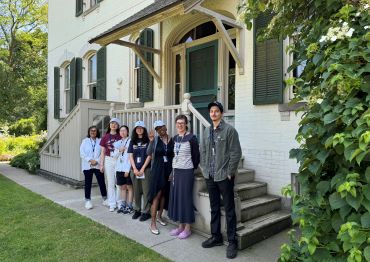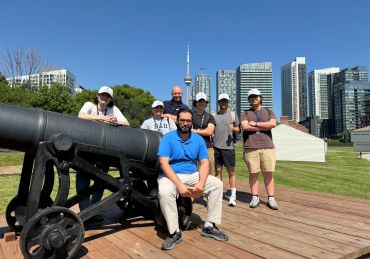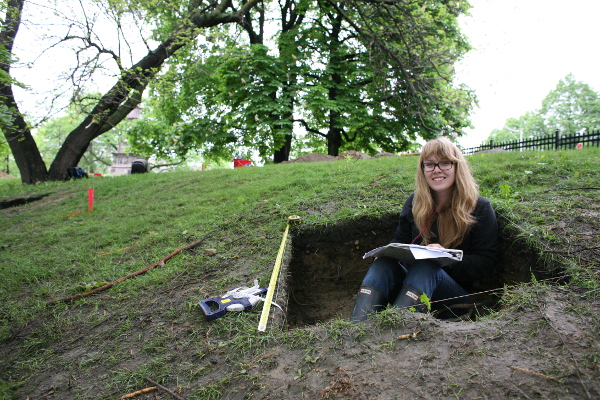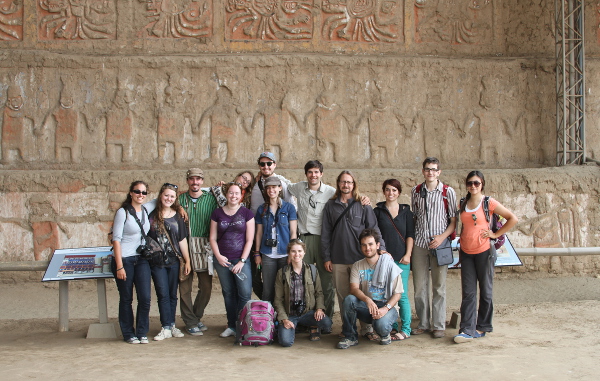(Header image: Students at an archaeological dig in Huaca, Colorado, with Professor Ed Swenson. Photo by Prof. Swenson.)
Summer 2025 Evolutionary Anthropology Field School
- Research Excursion Program - Field school - Austria - Professor Bence Viola - More information can be found here
Summer 2025 Social Cultural Research Opportunity
- ANT465H1F - Ethnographic Practicum: Toronto Tours


This course provides students with a partnered field experience by conducting ethnographic research on visitor tours in partner organizations in Toronto with faculty’s supervision. The project will be developed in collaboration with the partner organizations to offer students partnership-based experiential learning opportunities. Students will produce detailed ethnographic descriptions of tourist experiences, analyze how media representations and tourism infrastructure shape diverse visitor experiences, explore how existing infrastructure can be potentially repurposed for a decolonial or inclusive tour, and develop skills to communicate their findings to the broader audience.
Prerequisite: ANT380H1. Students who do not meet the prerequisite are encouraged to contact Prof Shiho Satsuka - s.satsuka@utoronto.ca
In 2025, students will be divided into two teams to conduct participant observation and interviews at the Spadina Museum and Fort York. The focus will be on two key aspects: (1) how these sites reflect the City of Toronto History Museums’ plans to diversify and decolonize heritage stories and (2) how visitors experience these efforts. The class will meet twice a week. The first meeting will be a workshop to prepare and reflect on research activities, while the second meeting will be dedicated entirely to immersive field research at each site. This fieldwork-based course offers students a unique opportunity to explore and contribute to the enriching narratives of Toronto and its history.
Summer 2025 Archaeology Lab Course
-
ANT406H1F - Lithics Analysis
Core reduction strategies, replication, experimental archaeology, use-wear, design approaches, ground stone, inferring behaviour from lithic artifacts.
- Prerequisite: ARH100Y1 and ARH205H1 and ARH 312Y1
Lithic analysis is an essential tool for archaeological practice. This is a hands on class, where students will get experience making and using stone tools and carry out analysis of an archaeological assemblage. The first two weeks are intensive, and we will be meeting for three hours a day from 1-4 PM. Weeks three and four will focus on reading articles and writing response papers. There will be two discussion meetings each week online, on Tuesday and Thursday from 1-3 PM. The final two weeks will be dedicated to the analysis of an archaeological assemblage, including data collection in Week 5 and data analysis in the final week. There will be an orientation from 2-3 PM on the Monday of each of these two weeks. The actual work can be done at any time (although in the first week you will need to work in the lab which is open 1-5 PM) but you will be expected to spend 10 hours on the project each week.
Summer 2025 Archaeology Field Schools
- ARH306Y1F Archaeological Field Methods
- Research Excursion Program - Field school - Ontario - Professor Charly Bank and Prof Katherine Patton (under ESS) - More information can be found here
ARH306Y1F Archaeological Field Methods
Application Process: Please fill in the following application form
![]() ARH 306Y Application Form - Summer 2025
ARH 306Y Application Form - Summer 2025
Please submit the application form to Josie Alaimo at josie.alaimo@utoronto.ca

This course provides training in the methods used in archaeological survey, site mapping and laying out of excavations, use of total stations, theodolites, and GPS, excavation, stratigraphy, square mapping, and stratigraphic recording, along with a sampling of other skills and methods, such as digital field photography, conservation, augering, and remote sensing. The course is designed to be short and intensive, with approximately 15 full days devoted mainly to fieldwork, and a short preparatory period in the first week. Before fieldwork begins, there will be an open-book online test to ensure that students have covered the basics that they will need to prepare themselves for the remainder of the course. The course will include some online lectures to go over information students will need to know to do the fieldwork and to cover topics not emphasized in the text or to add Canadian content. The bulk of the course, however, will be devoted to a variety of field exercises. It is anticipated that this will include survey, topographic mapping, augering, test-pitting, and excavation, screening, drawing, field conservation, field sampling, and photography. The goal is to teach fieldwork skills and knowledge that would be useful on prehistoric and historic sites, and in both academic fieldwork and the heritage industry, and not primarily to recover “real” archaeological data about these sites.
Preliminary Schedule Summer 2025
May 5-15 – Asynchronous reading assignment, prep for fieldwork at home
May 20 – Lecture 1 – Introduction, class mechanics, health and safety.
May 21 – Mapping instruction on use of levels and stadia for mapping (garden west of Anthropology building); begin mapping @ LRM (campus).
May 22, 23 – Mapping @ LRM.
May 26 – Lecture 2 – Laying in the grid, excavation and record keeping.
May 27 – Test-pit excavation of the survey zone.
May 28 – Test-pit excavation of the survey zone. Maps Due.
May 29 – Complete the survey, establish the grid, and prepare for excavation
May 30 - June 6 – Excavation
June 9 – Lecture 3 – Stratigraphic profile and Harris Matrix
June 10 – Excavation, complete units
June 11 – Excavation, Scan of Field Notebooks Due, begin profiles of units
June 12 – Complete profile, Backfill units
June 13 – Backfill, Harris Matrix and Profile Due. End of in-person course requirement.



